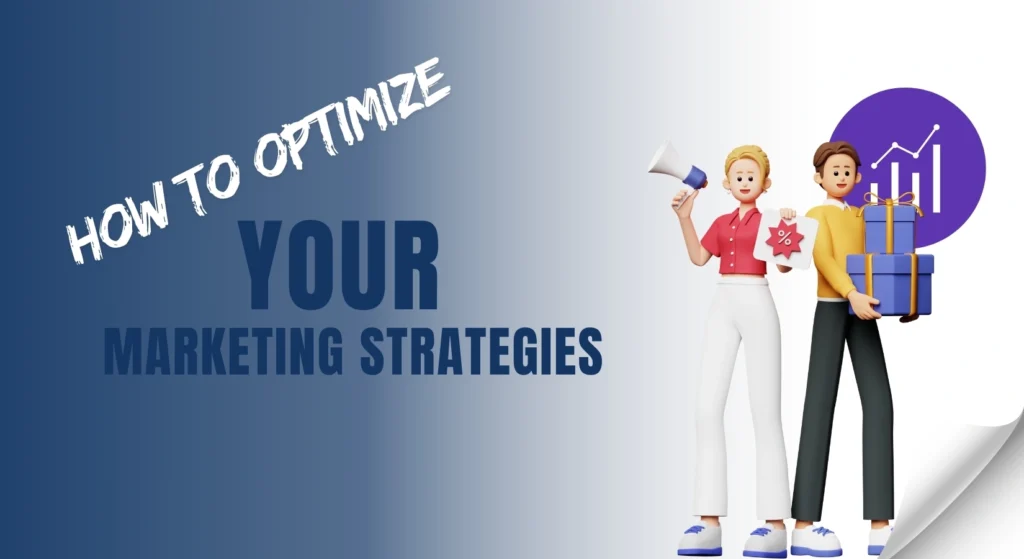In today’s competitive digital landscape, businesses must continuously refine and enhance their marketing approaches to stay ahead. One of the most effective ways to ensure your efforts yield results is to optimize your marketing strategies.
By leveraging proven SEO techniques, you can improve your online visibility, attract more customers, and boost your overall ROI. This article will guide you through various methods to optimize your digital marketing strategies, focusing on actionable SEO tactics that can make a significant impact.
SEO: First Step to Optimize Your Marketing Strategies.
Search Engine Optimization (SEO) plays a crucial role in the success of any digital marketing strategy. It involves optimizing your website and content to rank higher in search engine results pages (SERPs), making it easier for potential customers to find you. When done correctly, SEO can drive organic traffic to your site, increase brand awareness, and improve conversions. Optimize your marketing strategies by understanding the basics of SEO.
Keyword Research: The Foundation of SEO
Finding the Right Keywords
Keyword research is the first step in optimizing your marketing strategies. By identifying the right keywords, you can create content that aligns with what your target audience is searching for. Use tools like Google Keyword Planner, SEMrush, or Ahrefs to find relevant keywords with high search volume and low competition. Focus on long-tail keywords, as they are more specific and often have a higher conversion rate.
Implementing Keywords Strategically
Once you’ve identified the right keywords, the next step is to implement them strategically throughout your website and content. Place keywords in your titles, meta descriptions, headers, and body text, but avoid keyword stuffing, as it can lead to penalties from search engines. The goal is to naturally incorporate keywords in a way that enhances the readability and relevance of your content.
On-Page SEO: Enhancing Website Elements
Optimizing Title Tags and Meta Descriptions
Title tags and meta descriptions are critical elements of on-page SEO. The title tag should include your primary keyword and accurately reflect the content of the page. Meta descriptions, on the other hand, should be compelling and provide a brief summary of the page’s content. Both of these elements appear in search results and can influence click-through rates, so they must be optimized carefully.
Improving Website Structure and Navigation
A well-structured website with clear navigation not only enhances user experience but also helps search engines crawl and index your pages more efficiently. Use a logical hierarchy of categories and subcategories and ensure that your URLs are clean and descriptive. Implementing breadcrumbs can also improve navigation and help users understand where they are on your site.
Creating High-Quality Content
Content is king in the world of SEO. To optimize your marketing strategies, focus on creating high-quality, informative, and engaging content that provides value to your audience. Regularly update your blog with fresh content, and consider adding different types of media, such as videos, infographics, and podcasts, to keep your audience engaged.
Technical SEO: Ensuring a Smooth User Experience
Mobile Optimization
With the increasing use of mobile devices, it’s crucial to optimize your website for mobile users. Ensure that your site is responsive, meaning it adapts to different screen sizes and provides a seamless experience on any device. Google’s mobile-first indexing also means that mobile-friendly sites are more likely to rank higher in search results.
Improving Page Load Speed
Page load speed is a significant ranking factor, and slow-loading pages can lead to high bounce rates. To improve your page load speed, compress images, minify CSS and JavaScript files, and leverage browser caching. Tools like Google PageSpeed Insights can help you identify areas for improvement and provide suggestions on how to enhance your site’s performance.
Implementing Schema Markup
Schema markup is a form of microdata that helps search engines understand the content of your pages better. By adding schema markup to your site, you can enhance the appearance of your search results with rich snippets, such as star ratings, reviews, and event information. This not only improves click-through rates but also provides users with more relevant information at a glance.
Off-Page SEO: Building Authority and Trust
Link Building Strategies
Link building is a vital aspect of off-page SEO that involves acquiring backlinks from other reputable websites. High-quality backlinks signal to search engines that your site is trustworthy and authoritative, which can improve your rankings. Focus on earning backlinks through guest posting, creating shareable content, and building relationships with influencers and industry leaders.
Social Media Engagement
Social media plays a significant role in off-page SEO by driving traffic to your site and increasing brand visibility. Regularly share your content on social media platforms, engage with your audience, and encourage social sharing. While social media signals don’t directly impact search rankings, they can indirectly contribute to your SEO efforts by increasing your content’s reach and generating backlinks.
Managing Online Reputation
Your online reputation can significantly impact your SEO performance. Encourage satisfied customers to leave positive reviews on platforms like Google My Business, Yelp, and industry-specific review sites. Address any negative reviews promptly and professionally, and work on building a positive online presence through PR efforts and community involvement.
Frequently Asked Questions (FAQ)
1. What is the most important aspect of SEO when trying to optimize your marketing strategies?
The most important aspect of SEO is keyword research. It lays the foundation for your entire strategy by helping you understand what your target audience is searching for and how you can align your content with those searches.
2. How often should I update my content to keep it optimized?
It’s recommended to update your content regularly, especially for blog posts or pages that are critical to your SEO strategy. Updating content every 6-12 months can help maintain its relevance and improve its performance in search rankings.
3. How can I improve my website’s mobile optimization?
To improve mobile optimization, ensure your site is responsive, compress images for faster loading, and test your site’s mobile performance using tools like Google’s Mobile-Friendly Test. This will ensure a seamless experience for mobile users and improve your mobile search rankings.
4. Why is link building important in optimizing your marketing strategies?
Link building is important because it helps establish your site’s authority and trustworthiness in the eyes of search engines. High-quality backlinks from reputable sources can significantly boost your search rankings and drive more organic traffic to your site.
5. How do I measure the success of my SEO efforts?
You can measure the success of your SEO efforts by tracking key metrics such as organic traffic, keyword rankings, bounce rates, and conversion rates. Tools like Google Analytics and SEMrush can help you monitor these metrics and assess the effectiveness of your strategy.
Conclusion
To successfully optimize your marketing strategies, it’s essential to stay up-to-date with the latest SEO trends and continuously refine your approach. SEO is not a one-time effort but an ongoing process that requires regular monitoring, analysis, and adjustment. By implementing the techniques discussed in this article, you can enhance your online presence, attract more traffic, and achieve better results for your business.



